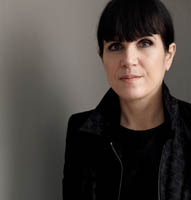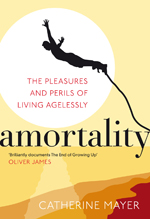Age doesn’t rule here on the North Shore.
Most people aren’t inclined to let their “number” dictate how they look, how they act, or how they pursue their personal goals, such as family and career. Little might these North Shore residents realize, they’re part of a recent trend, which author Catherine Mayer named “amortality”—that is, living agelessly. According to Mayer, who is the London bureau chief of Time magazine, aging has fundamentally changed in recent years, thanks to science and technologies that have extended the human life span, making it possible for people to stay healthy and active much longer. In other words, getting old is so over!
 Mayer coined the term “amortal” in 2009 and her book on the subject, “Amortality: The Pleasures and Perils of Living Agelessly” (Vermilion), came out last year. Amortals “live in the same way, at the same pitch, doing and consuming much the same things, from late teens right up until death,” Mayer writes, citing Madonna, Hugh Hefner, Mark Zuckerberg, Simon Cowell, Bill Gates, Woody Allen and Mick Jagger as examples of prominent amortals.
Mayer coined the term “amortal” in 2009 and her book on the subject, “Amortality: The Pleasures and Perils of Living Agelessly” (Vermilion), came out last year. Amortals “live in the same way, at the same pitch, doing and consuming much the same things, from late teens right up until death,” Mayer writes, citing Madonna, Hugh Hefner, Mark Zuckerberg, Simon Cowell, Bill Gates, Woody Allen and Mick Jagger as examples of prominent amortals.
We sat down with Mayer to discuss the secrets of the amortal life. To find out if you are amortal, take the quiz here.
You write that amortality is “a social epidemic.” If you’re not already living agelessly, can you catch the bug at any time?
Amortals aren’t born, they’re made. If you think of the vampire myth—the popularity of “Twilight” and the entire vampire genre right now is no coincidence—a vampire can be made at any age, whenever they’re bitten.
What are the benefits of amortality?
Your attitude can have a profound physical and psychological impact. Decades ago, Harvard Professor of Psychology Ellen Langer did a famous experiment where she got two groups of elderly men to stay in an old hotel retro-fitted to look like 20 years earlier. One group was told to act as if they’d traveled back in time. The other group was allowed to reminisce. The ones who time-traveled registered much larger improvements in physical and cognitive skills.
It’s dangerous to think things like, “I’m 40, I’m becoming a middle-aged woman, therefore I won’t wear a mini-skirt and I’m not going to think of myself as sexually attractive,” etc. The awareness of age makes people feel old and act old, and therefore become old.
 You write that amortals are particularly adept at distracting themselves from death. What’s the best way to do that?
You write that amortals are particularly adept at distracting themselves from death. What’s the best way to do that?
Terror Management Theory (TMT) is the branch of psychology that says humans are the only animal that know they’re going to die, so a lot of human activity is geared toward pushing away thoughts of mortality or making ourselves feel better about it. High-status activity is one of the ways we push away thoughts of mortality. Having children used to be quite effective as a high-status activity. But it lost status for women as they gained more options.
You were raised in a family of amortals, with Chicago roots. And I bet your husband, Andy Gill, of the influential band Gang of Four, is an amortal as well?
Yes, he is. The music industry, of all industries, is probably the most amortal from top to bottom. I said something to him recently like, “When you stop touring and making records … ” and he just looked at me blankly, as if to say, “I’m never going to do that!”
What are some of the dangers of amortality?
There are bad things in both attitudes. As an amortal, you can look and seem completely ridiculous. You can be unprepared for the harsh shock of when your body fails. You can take on things you’re not capable of. On the other hand, if you think of age as shutting off opportunities, you can end up old before your time. It’s a question of finding a balance.
{loadposition incontent_health3}
I love that you don’t prescribe any austere regimens for staying healthy and energetic. What are your own practices?
I love good food. I begrudge a system where it is cheaper to eat a prepared food product than an unprepared one. As for exercise, people should do the things that make them feel good. I do Pilates and have a good gossip, so it doesn’t feel like work. If you’re having a good time, that feeds through to a sense of wellbeing. Having a good time is a shallow aim in life, but that sense of wellbeing means you have more energy to devote to things, people and causes that matter.

